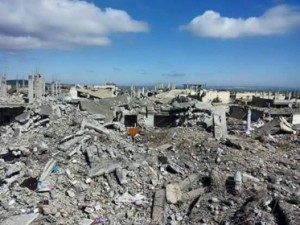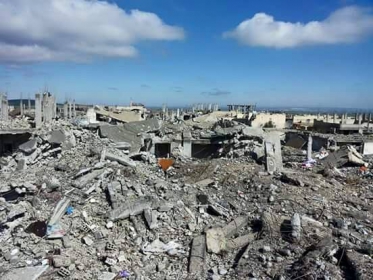 The Cairo Institute for Human Rights Studies (CIHRS) regards the unanimous adoption of the United Nations Security Council (UNSC) resolution 2254 on 18 December 2015 as an expression of a serious international will and consensus to move forward towards achieving the direly needed political solution in Syria. At the same time, CIHRS regrets that essential guarantees for justice, accountability and the safeguard of human rights remain missing from the heart of discussions. More particularly, the resolution has sorely missed any reference on how to address past and ongoing crimes of international human rights and humanitarian law committed by the different local and international actors in Syria. The reluctance of the international community to recognize that without accountability there can be no sustainable peace is reprehensible.
The Cairo Institute for Human Rights Studies (CIHRS) regards the unanimous adoption of the United Nations Security Council (UNSC) resolution 2254 on 18 December 2015 as an expression of a serious international will and consensus to move forward towards achieving the direly needed political solution in Syria. At the same time, CIHRS regrets that essential guarantees for justice, accountability and the safeguard of human rights remain missing from the heart of discussions. More particularly, the resolution has sorely missed any reference on how to address past and ongoing crimes of international human rights and humanitarian law committed by the different local and international actors in Syria. The reluctance of the international community to recognize that without accountability there can be no sustainable peace is reprehensible.
The resolution rightly reaffirms the need for the “independence, territorial integrity, and non-sectarian character” of Syria, and the need “to protecting the rights of all Syrians, regardless of ethnicity or religious denomination.” It emphasizes the “critical need to build conditions for the safe and voluntary return of refugees and internally displaced persons to their home areas and the rehabilitation of affected areas.” The resolution also recalls the immediate need to cease all attacks against civilians, medical facilities and to halt the indiscriminate bombing by air and ground in populated areas. It also calls for allowing full humanitarian access to all areas, including in besieged location, and the immediate release of the arbitrary detained including women and children.
For this purpose, the resolution endorses an initial road map, with an ambitious time-line, for political talks in Syria under the auspices of the UN and building on what has so far been agreed upon in the rounds of negotiations by the International Syrian Solidarity Group(ISSG)that commenced in Vienna on October 30.
Although the resolution lays out a general framework leading towards ending the conflict in Syria, the presence of some serious shortcomings may lead to rendering the current international efforts into one more failing round of negotiations to solve the ongoing crisis. This includes the declared objectives of countering the spread of terrorist groups like ISIL, Al-Qaeda and others. The international community continues to lack a clear vision on the way to move forward to implement the peace plan set forth in the resolution. Meanwhile, civilians continue to pay the price of this international failure, either by death, displacement or starvation from the continuous besiegement.
As the Chair of Commission of Inquiry on Syria Mr. Sergio Pinheiro has highlighted in his statement: “The international community agrees that there is no military solution to this conflict. Yet, the arming and funding of the warring parties, compounded by the flow of foreign fighters, fuel the illusion that military victory is possible. Impunity emboldens perpetrators of atrocities and weapons empower them.” As a result “a coordinated accountability strategy and the will to implement it effectively are desperately needed.”
It is noteworthy that resolution 2254, unlike its precedents in the same regards, calls on all states to use their sphere of influence for ending the ongoing violations, alluding to third state responsibility in the prevention of the commission of international crimes. In this regards, CIHRS would like to recall that international law proscribes to all states an ergaomnes obligation to bring wrongdoing parties, committing serious violations of peremptory norms of international law, to desist from such acts and ensure respect for international law. This entails a duty of non-recognition of the acts of a wrongdoing authority as lawful, and an obligation to refrain from aiding or assisting violations. States must take positive steps to prevent, punish, investigate and redress human rights violations and prosecute perpetrators of international crimes.
It is clear that the major obstacle which has paralyzed the implementation of a political solution so far is the international divide on the fate of the actors responsible for serious crimes in Syria, most particularly those at the highest echelon of the current regime. This same reluctance of addressing accountability is also clear in the inclusion of at least two controversial groups within the Riyadh conference round of talks, while serious evidence exists on their involvement in the commission of international crimes. It is challenging to conceive that after almost five years of death and displacement, the chief parties responsible for atrocities committed against the Syrian population are expected to lead the country to the aspired democratic future.
Furthermore, the Security Council remains completely silent on the nature and scale of foreign military intervention currently taking place in Syria, under the banner of the fight against terrorism. There is significant amount of evidence showing that serious IHL violations are being committed against civilians in conducting these military operations, more particularly in Aleppo by the Russian army. The international community needs to coordinate the military efforts under a Chapter VII resolution, to define the precise mandate and scope of intervention, and to avoid further violations of International law. A resolution on a political process that does not sufficiently take into account the intensification of fight on the ground raises serious questions on its credibility and effectiveness.
The international community has shown more readiness to cooperate recognizing full third state responsibility and strong action when it comes to groups labeled as terrorists within resolution 2253 adopted the same day, while for the other warring parties there are no serious steps taken to bring about any form of deterrence to halt the commission of crimes. This is even more remarkable knowing that majority of victims in Syria and the continuous flow of refugees and internally displaced persons are caused by the Assad regime. In addition, the bloody nature of the repression faced by the Syrian people in their demands for freedom and change is what has laid fertile ground for the presence of extremist groups in Syria and what continues to sustain their existence.
On the other hand, the renewal of the resolution on the passage of humanitarian aid on December 22 (resolution 2258) further stressed the dire humanitarian needs of the Syrian people, in particular the almost 400,000 people in besieged areas. The previous resolution addressing humanitarian access was heavily criticized for not responding sufficiently to the reluctance of the regime authorities to authorize access of humanitarian aid to civilians in besieged and hard to reach areas. The renewal of the same resolution without offering the needed guarantees to allow access of humanitarian assistance , and where there are no follow-up mechanisms on the reports of the monitoring mechanism, seem in vain. The monitoring mandate renewed in resolution 2258 should include the capacity to issue specific recommendations on how to best provide access to humanitarian assistance, and possibilities of sanctions against the parties responsible of blocking of such access.
The world is awaiting a courageous and comprehensive package that could lead to a sustainable solution to the conflict in Syria. Short-terms solutions and further militarization to parties of the conflict have not yielded any success. The Security Council should understand that there is a need to address contentious politics in Syria through clearer steps towards peace and that would ensure accountability to all parties to the conflict. Unless matched with concrete action on the ground to stop ongoing attacks against civilians and civilian populated areas, the resolution reached and further negotiations around Syria will remain void of any meaning.
Share this Post

